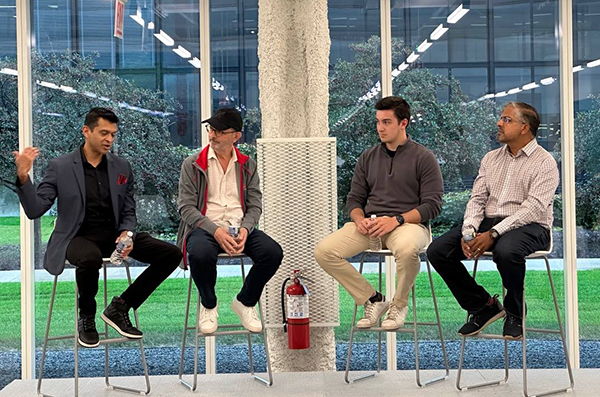A.I. Major Already Ahead of the Arc

First Semester Hackathon Leads to Revolutionary Software
Josh Silets (IIT, 2023) is no ordinary student. As he finishes his undergraduate studies at the Illinois Institute of Technology in Chicago, he is among the first anywhere to receive a bachelor’s degree in artificial intelligence. But there is nothing artificial about the road to excellence that Silets has embarked on, and the milestones he’s already achieved.
In fact, as CEO of GridLink, a startup company he co-founded with two Delt brothers, Ryan McPhail (IIT, 2023) and Gabriel Bryk (IIT, 2023), he finds himself in a position that many would include on their very long-term goal list.
And, he has learned that long-term goals do not work for him. “If you think long term, then it’s really easy to start daydreaming,” he said. “I want to be realistic about what we’re building here. It’s short-term goals. How do we be successful over the next month? How do we be successful over the next six months, the next year?”
And with a company and product that is less than a year into existence and still developing, Silets has remained grounded by the hard work and dedication that has gone into earning the recognition they’ve achieved so far.
GridLink is an EV fleet management platform designed to help fleet operators reduce operational costs and increase vehicle efficiency. It evolved from a competition and became an idea with the potential to streamline the effects of large corporations on our world’s power sources.
After winning a hackathon with Bryk during the first semester of their freshman year, the wheels were in motion and competitions were in their blood.
Fast forward to fall 2022, and Silets and his two co-founders were at it again. “We entered this Computing for Social Good competition just to see what we would build to see if we could win anything,” Silets said. “About a month later, we were in the finals. We presented what we had built and ended up winning $10,000 from the competition.”
They were happy in their victory, accomplishing what they set out to do and ready to move on. “But the school and the organizers of the competition thought that we maybe had something, and they told us to talk to industry professionals. They started connecting us with the people they thought we should speak with,” he said. And it turned out, they were on to something with their energy resource management platform, an artificial intelligence model that would determine when you use solar and when you should use your battery storage system.
From there, they enrolled in a startup accelerator program through the Kaplan Institute for Entrepreneurship at Illinois Tech, where they were paired with mentors and advisors and were able to fine-tune their idea into a marketable product that is a charging management platform for electric vehicle fleets.
“Amazon, UPS, Comcast, all of these companies that have a ton of vehicles are getting a lot of incentives from the government to switch over to electric vehicles,” Silets explained. “But as they do that, they face a few core challenges. The price of electricity is pretty variable compared to gas, which is stable over the course of a week or two. But the price of electricity can double over the course of a few hours. This is something you need to think about.
“And you need to make sure your vehicles are as charged as they need to be to do deliveries or go on service orders. Electrification leads to very complex operational issues.”
Silets knew they could help find a solution. “Fortunately, my co-founders and I are really good at solving complex operations issues with software, so that’s what we built. We were able to reduce the impact of charging that these vehicles have on the grid. We’re able to save vehicle owners over 50 percent of their costs of charging.”
They were not the only ones to recognize the effect this could have. At the end of their accelerator course, they entered a pitch competition and won $30,000, opening the doors for further success. They subsequently were in the largest student business plan competition in the world at Rice University in Houston, as the first-ever team from Illinois Tech to be accepted and invited.
Today, their pilot program is preparing to launch with an Illinois utility company. When looking toward growth and what’s in store for the future, Silets still prefers to take things one day at a time. He is realistic in the expectation that others will develop similar software, and he’s okay with that. In fact, he anticipates it will be part of the journey. “We’ve seen a massive trend with companies coming into this charging space,” he said. “They get a pilot or two under their belt, they raise a larger investment round, and then they sell into these larger companies. And that’s exactly what we plan on doing.”
Fall 2023 Techstars Chicago Announcements:
- GridLink team is thrilled to be a part of the Techstars Chicago Accelerator.
- Fall 2023 Techstars Chicago Class
